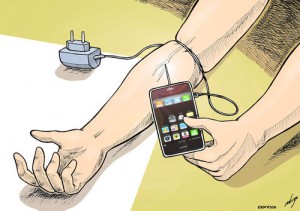
So, over the past couple of years, I’ve frequently run across people who insist that those newfangled iPhones and Android phones are just ruining newer generations of people… mainly iPhones, for some reason. There’s plenty of articles out there talking about “iPhone addiction” and even a pseudoscientific study from Stanford where subjects are pretty much encouraged to self-identify as addicts, reporting that they feel the devices are “like extensions of their brain or body.”
The most interesting trend was how quickly the iPhone became an indispensable part of the students’ lifestyles, and how many of them openly acknowledged they would be lost without it.
Nearly 85 percent of the iPhone owners used the phone as their watch, and 89 percent used it as their alarm clock. In fact, 75 percent admitted to falling asleep with the iPhone in bed with them, and 69 percent said they were more likely to forget their wallet than their iPhone when leaving in the morning.
Many students readily acknowledge how much they rely on their iPhones. When asked to rank their dependence on the iPhone on a scale of one to five — five being addicted and one being not at all addicted – 10 percent of the students acknowledged full addiction to the device, 34 percent ranked themselves as a four on the scale, and only 6 percent said they weren’t addicted at all.
There’s just one problem with all of this: The behaviors described
aren’t defining characteristics of addiction.
Let’s consider for a moment what addiction really is. The iPhone isn’t a substance, like heroin or alcohol, so comparing to substance addition isn’t quite appropriate. But addiction in general is the “continued use of a substance or behavior despite adverse dependency consequences.” And if we consider behavioral addiction – since using a smartphone is a behavior – we find that one must “repeatedly engage in an action until said action causes serious negative consequences to the person’s physical, mental, social, and/or financial well-being.”
Taking this into account, let’s rationally ask ourselves the question: what exactly is detrimental, negative, or harmful about:
- Using a smartphone as an alarm clock or watch?
- Accidentally falling asleep with a smartphone in your bed?
- Using a smartphone to tweet, or surf the web, or go on Facebook?
Granted, there can be too much of the above activities: plugging in your headphones all the time and ignoring a significant other, or refusing to interact with real people around you because you’re constantly playing Fruit Ninja. But the mere use of these devices, or using them to replace other, older generation devices (like standalone alarm clocks or old fashioned daytimers) does not qualify as smartphone addiction. Arguably, our society has an even greater dependence on things like electricity, or the internal combustion engine, or internet access, or refrigerators. Yet, while these were once new things in the lives of ordinary people that fundamentally changed how they behaved, few people seem so willing to wean society of its “addiction” to this things.
The problem is, people have been saying this about every new technology that’s come out there. The telephone prevents personal interactions because you don’t have to visit people to talk to them anymore, or take the time to write them letters if they’re far away. TV prevents personal interactions because of the possibility that someone can stare at a screen all day. E-mail prevents personal interactions because nobody uses the phone anymore. Text messaging prevents personal interaction because no one writes long e-mails anymore.The problem is, none of it is true. The technology doesn’t prevent personal interaction… it’s that some people use the technology to avoid personal interactions and socializing. Take away facebook, the iPhone and their computer, and these people would be watching TV all day. Take that away and they’d read a book or something.

All of the previous technologies made things happen in ways that they “never used to.” Every technological change permits people to do something they never used to do before, and then there would be people preaching woe about how that change is bad because you people no longer do things in more traditional ways. Ultimately, that tends up being their only argument… that they want things done “the way it used to be.”
Then there seems to be this fetishism about Apple, specifically. iPhones are addicting. You shouldn’t use your iDevices so much. When as any Android user will gleefully gloat, Apple allegedly is NOT what most kids these days are using.
So why aren’t people railing against Android? And remember when Crackberry was a thing?
Don’t get me wrong: I agree there’s a problem. I just happen to think the problem is actually twofold:
1. People who don’t truly understand the applications of new technology, and rather than trying to understand how to use or apply it, they instead prefer to complain about how it’s “destroying” society, and
2. People who have addictive personalities, get addicted to certain things like their gadgets, and then prefer to blame the gadget rather than make the effort to improve themselves… completely ignoring the fact that there are plenty of other individuals who can still use their gadgets in moderation and still function quite well in society.
Both are part of a well known phenomenon in psychology known as projection bias, and it is something that has been observed well before facebook or iPhones existed.
